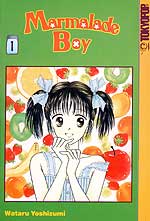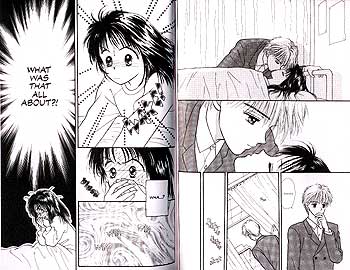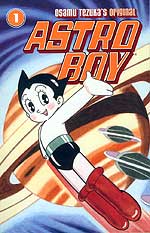
|
Be you child or adult you have never read a comic or even any kind of book like "Marmalade Boy." It will be new to you not because it stars a spindly, ordinary, modern-day 16-year-old high-school girl, or because the story involves no adventures more outrageous than light, comedic romance (both of which are sadly unusual in American comicbooks, but not unheard of.) The novelty comes from reading it "backwards." The L.A.-based Tokyopop has begun publishing a whole series of pocket-sized paperbacks that reprint Japanese comicbooks, called "manga," the way they originally appeared, reading right to left. The experience is a bit like wearing generously-sized shoes on the wrong feet. It feels weird but you can get used to it. Perhaps younger comix fans, with less investment in the usual, Western way of reading, would adapt to it more easily.
 Yuu kisses Miki in "Marmalade Boy." Pages and panels read right to left
Yuu kisses Miki in "Marmalade Boy." Pages and panels read right to left |
Written and drawn by a woman, Wataru Yoshizumi, "Marmalade Boy" has a beguiling comedic charm that make it entertaining even to those beyond its target demographic. It begins when Miki Koishikawa nearly drops dead of shame as her parents announce they are switching partners with another couple, the Matsuuras, and that everyone will live together in a big house. But trouble really begins when she meets their son, Yuu, the dreamiest, most exasperating boy on planet earth! Even after 200 pages the complications have only just begun. The remaining seven volumes will appear on a bi-monthly basis starting with volume two, out in July. These kind of teased out, black and white, multi-volume stories are typical of Japanese manga storytelling. Also typical, Yoshizumi's drawings mix saucer-eyed, button-nosed caricatures with realistic details, particularly of the outfits the characters wear. Though little more than a childish soap opera, the natural, breezy dialogue (translated by Jack Niida), the occasional editor's notes on Japanese culture, and the likable characters make for a delightful read.
"Astro Boy," by Osamu Tezuka, likewise transcends its natural audience of robot-obsessed boys. In fact, Boomers may pick it up to relive their memories of the '60s animated TV show based on these stories. First appearing in Japan in 1951, until now the original manga have never been published in the U.S. Dark Horse plans on putting out the complete multi-volume collection (printed left to right, by the way) on a monthly basis. It's about time. Astro Boy has become iconic in Japan. Considered the "God of Manga," Tezuka's work laid the foundation of manga style. This is the Corn Flakes of Japanese pop culture.

|
The first volume includes Astro Boy's origin as a Pinocchio-like, mechanical substitute for a scientist's dead son. Cared for mostly by his teacher, Mr. Mustachio, the perpetually darling, slightly androgynous little robot boy uses his powers of flight, super strength and rear-mounted machine guns to fight evil robots. The longest of the three self-contained stories, "The Hot Dog Corps," involves a queen whose robot spaceship pilots shoot down any rocket headed for the moon. Filled with the mischievous mayhem that boys love, but told with wit and imagination, the stories always have an underlying theme of friendship and goodwill. Drawn with a whimsical simplicity based heavily on the Disney cartoons, Tezuka has a loopy sense of humor. He will sometimes insert nonsense characters into a scene just for fun. One Brechtian moment has Mr. Mustachio kicking a doodle off the page, yelling, "Hey! This is an important panel in the strip!"
What a relief for comix fans to finally have something new they can give their nieces and nephews. Wataru Yoshizumi's "Marmalade Boy" and Osamu Tezuka's "Astro Boy" not only provide age-appropriate entertainment, but a window into another culture. These stories, filled with innocence, humor and wonder, will make girls and boys consume them with glee, until the books become dog-eared and swollen with rain. Be sure and keep extra copies for yourself.
"Marmalade Boy," and "Astro Boy" should be available at better comicbook stores. "Marmalade Boy" and the other right-to-left titles can also be found through the Tokyopop website
TIME.comix will return in two weeks, on May 7
